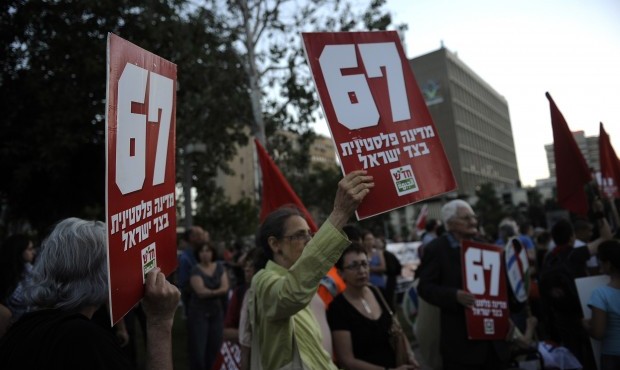In the week of the 46th anniversary of the Six-Day War of 1967, it is clear now that said war was far worse than we had thought. The worst thing is that we failed to draw lessons from this, leading to a series of successive tragic “endings” instead of igniting the awakening we badly needed.
Later, we fell subject to the worst of delusions following the outcome of another “earthquake,”, namely the delusion surrounding the “victory” in the October 1973 Yom Kippur war. This second “earthquake” shattered the remainder of the dreams—or delusions, in the words of the pessimists—that Arabs continued to cherish at the time in an attempt to raise their morale and convince themselves that there is nothing wrong with falling down—the problem is the fear of getting back up again.
If we consider the situation in the Arab region today, it will become clear that we committed a big mistake by ignoring two key facts necessary for any awakening—namely, to respect human rights, and to protect and safeguard them through institutions and mechanisms allowing for a smooth and systematic transition of power.
The borders of any country in the world do not come out of nothing; rather, they are drawn by world powers. Changes to borders are not final in and of themselves, and today many countries even in Europe—“the mother of democracies”—are redrawing their borders in one way or another without negatively affecting human rights. On the contrary, this is having a positive impact on human rights.
Václav Havel did not use the military to maintain the borders of Czechoslovakia, preferring to respect the Slovakians who were desirous of separating from the Czech Republic in a friendly manner. This is a step whose negative effects were soon alleviated by the expansion of the European Union’s umbrella.
Over the past years, support has run high for the Scottish National Party (SNP) in Britain, which campaigns for Scottish independence. On the other hand, the UK Independence Party (UKIP) actively campaigns, in other parts of Britain, for the UK’s withdrawal from the EU. Rather than using coercion and fabricating charges of treason, both parties observe the law and respect different opinions.
In Spain, there is a constant competition between campaigners for independence from the Spanish federation and those who call for further consolidation of the current federation. After years of fruitless violence in the Basque Country, the majority of people finally voted against full independence, disproving the claims and pretexts of the advocates of violence.
Wise societies are always keen to reach consensus and settle differences according to the constitution, public interest, and the principles of justice and equality.
Forty-six years after the 1967 war, we are facing a dangerous increase in the number of “failed states” across the Arab region. There are projects, some of which are already underway, to partition and divide countries such as Iraq, Syria, Lebanon, Sudan, Yemen and Libya. Other countries are not immune to internal tensions resulting from a discourse of partition and fragmentation similar to the one which has disrupted the very concept of the “state” as we knew it, thus giving rise to the so-called “failed states.”
There can be no doubt that the responsibility for this miserable situation lies with the region’s people, leadership, and popular and political organizations. However, if there is an excuse, this is the regional influences and international interests that made it easy to bring about this situation. The stance taken by international powers towards the people of the region has always been far from honest and understanding.
Absolute US support for Israel on the basis of “maintaining the strategic balance” in the Middle East during the Cold War—which includes the Yom Kippur War—crystallized even more following the collapse of the Soviet Union. Washington now openly seeks to “maintain Israel’s military superiority” without halting its escalating settlement activities, consequently provoking feelings of disappointment and misery both inside and outside the Palestinian territories. With this, Arab moderation began to dwindle. Besides, US monopoly of the political “game” in the region, as Anwar Sadat used to say, only serves to open the door to Arab and Islamic extremism.
Today, the way Russia is dealing with the Syrian tragedy is no different from the stance the US has always adopted towards the Palestinian crisis. What we are facing today is an ugly situation full of arrogance, obstinacy and indifference to the blood and suffering of the Syrian people on the part of Russia. This situation can only be understood as the Russian Bear seeking revenge and exploitation of Washington by joining forces, whether directly or indirectly, with the theocratic regime in Iran that has nothing in common with the allegedly liberal Moscow regime.
We have also heard remarks this week from Vladimir Putin that any attempts to intervene militarily in Syria are “doomed to fail,” while US secretary of state John Kerry has once again expressed “concern” at the escalating situation in Syria—not to mention Britain’s announcement that lifting the arms embargo on the opposition depends on the Geneva II conference. All such comments only serve to exacerbate the situation and incite extremism.
The blood of the Syrian people seems to have lost its value after the indifference shown to the desire of the moderates in the region for coexistence as well as handing power to an authoritarian regime that seeks no solutions, shows no care for cooperation, and rejects all other opinion but its own.
All of these saddening “No’s” bring to mind the “Three No’s” of the 1967 conference held in Khartoum, capital of Sudan…before its division.
